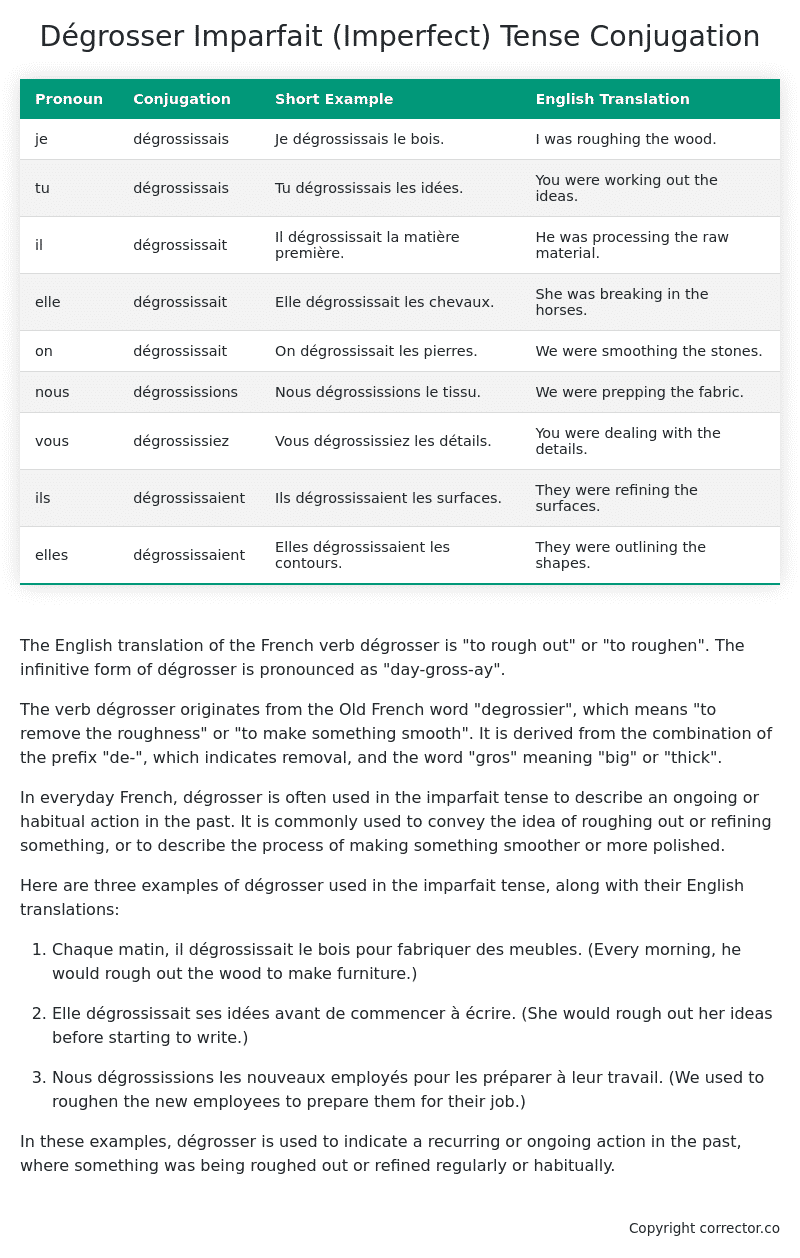Imparfait (Imperfect) Tense Conjugation of the French Verb dégrosser
Introduction to the verb dégrosser
The English translation of the French verb dégrosser is “to rough out” or “to roughen”. The infinitive form of dégrosser is pronounced as “day-gross-ay”.
The verb dégrosser originates from the Old French word “degrossier”, which means “to remove the roughness” or “to make something smooth”. It is derived from the combination of the prefix “de-“, which indicates removal, and the word “gros” meaning “big” or “thick”.
In everyday French, dégrosser is often used in the imparfait tense to describe an ongoing or habitual action in the past. It is commonly used to convey the idea of roughing out or refining something, or to describe the process of making something smoother or more polished.
Here are three examples of dégrosser used in the imparfait tense, along with their English translations:
-
Chaque matin, il dégrossissait le bois pour fabriquer des meubles.
(Every morning, he would rough out the wood to make furniture.) -
Elle dégrossissait ses idées avant de commencer à écrire.
(She would rough out her ideas before starting to write.) -
Nous dégrossissions les nouveaux employés pour les préparer à leur travail.
(We used to roughen the new employees to prepare them for their job.)
In these examples, dégrosser is used to indicate a recurring or ongoing action in the past, where something was being roughed out or refined regularly or habitually.
Table of the Imparfait (Imperfect) Tense Conjugation of dégrosser
| Pronoun | Conjugation | Short Example | English Translation |
|---|---|---|---|
| je | dégrossissais | Je dégrossissais le bois. | I was roughing the wood. |
| tu | dégrossissais | Tu dégrossissais les idées. | You were working out the ideas. |
| il | dégrossissait | Il dégrossissait la matière première. | He was processing the raw material. |
| elle | dégrossissait | Elle dégrossissait les chevaux. | She was breaking in the horses. |
| on | dégrossissait | On dégrossissait les pierres. | We were smoothing the stones. |
| nous | dégrossissions | Nous dégrossissions le tissu. | We were prepping the fabric. |
| vous | dégrossissiez | Vous dégrossissiez les détails. | You were dealing with the details. |
| ils | dégrossissaient | Ils dégrossissaient les surfaces. | They were refining the surfaces. |
| elles | dégrossissaient | Elles dégrossissaient les contours. | They were outlining the shapes. |
Other Conjugations for Dégrosser.
Le Present (Present Tense) Conjugation of the French Verb dégrosser
Imparfait (Imperfect) Tense Conjugation of the French Verb dégrosser (You’re reading it right now!)
Passé Simple (Simple Past) Tense Conjugation of the French Verb dégrosser
Passé Composé (Present Perfect) Tense Conjugation of the French Verb dégrosser
Futur Simple (Simple Future) Tense Conjugation of the French Verb dégrosser
Futur Proche (Near Future) Tense Conjugation of the French Verb dégrosser
Plus-que-parfait (Pluperfect) Tense Conjugation of the French Verb dégrosser
Passé Antérieur (Past Anterior) Tense Conjugation of the French Verb dégrosser
Futur Antérieur (Future Anterior) Tense Conjugation of the French Verb dégrosser
Subjonctif Présent (Subjunctive Present) Tense Conjugation of the French Verb dégrosser
Subjonctif Passé (Subjunctive Past) Tense Conjugation of the French Verb dégrosser
Subjonctif Imparfait (Subjunctive Imperfect) Tense Conjugation of the French Verb dégrosser
Subjonctif Plus-que-parfait (Subjunctive Pluperfect) Tense Conjugation of the French Verb dégrosser
Conditionnel Présent (Conditional Present) Tense Conjugation of the French Verb dégrosser
Conditionnel Passé (Conditional Past) Tense Conjugation of the French Verb dégrosser
Conditionnel Passé II (Conditional Past II) Tense Conjugation of the French Verb dégrosser
L’impératif Présent (Imperative Present) Tense Conjugation of the French Verb dégrosser
L’impératif Passé (Imperative Past) Tense Conjugation of the French Verb dégrosser
L’infinitif Présent (Infinitive Present) Tense Conjugation of the French Verb dégrosser
L’infinitif Passé (Infinitive Past) Tense Conjugation of the French Verb dégrosser
Le Participe Présent (Present Participle) Tense Conjugation of the French Verb dégrosser
Le Participe Passé (Past Participle) Tense Conjugation of the French Verb dégrosser
Struggling with French verbs or the language in general? Why not use our free French Grammar Checker – no registration required!
Get a FREE Download Study Sheet of this Conjugation 🔥
Simply right click the image below, click “save image” and get your free reference for the dégrosser imparfait tense conjugation!

Dégrosser – About the French Imparfait Tense
NOTE: To take a deep dive into all the French tenses then see our article on Mastering French Tense Conjugation.
Formation of the Imparfait Tense
For regular -er verbs:
For regular -ir verbs
For regular -re verbs
Common Everyday Usage Patterns
Description of Past Habits
Background Information
Mental and Emotional States
It’s employed to express emotions, thoughts, or physical sensations in the past. For example: “J’étais content quand il est arrivé.” (I was happy when he arrived.)
Ongoing Actions
Points to Note About the Imparfait Tense
Passé Composé vs. Imparfait
Conditional
Si Clauses
Narration
I hope you enjoyed this article on the verb dégrosser. Still in a learning mood? Check out another TOTALLY random French verb imparfait conjugation!


